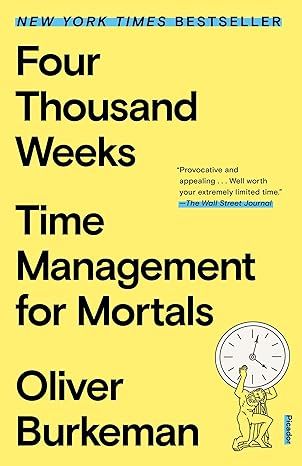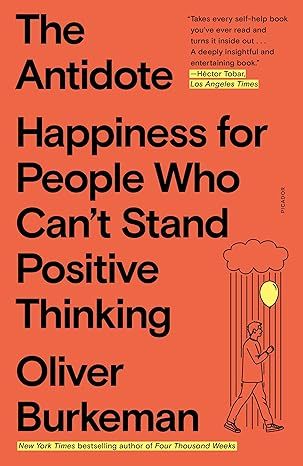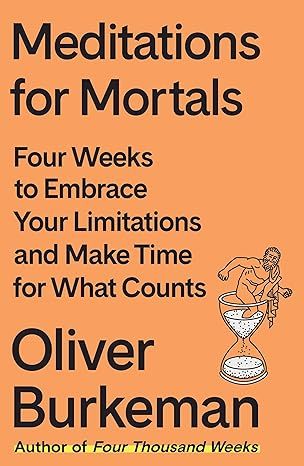Four Thousand Weeks
4.6 out of 5
10,399 global ratings
AN INSTANT NEW YORK TIMES BESTSELLER
Includes an interview with James Hollis
“Provocative and appealing . . . Well worth your extremely limited time.” ―Barbara Spindel, The Wall Street Journal **
There’s a good reason why everyone has been talking about Oliver Burkeman’s New York Times bestseller, Four Thousand Weeks. Nobody needs to be told there isn’t enough time. Whether we’re starting our own business, or trying to write a novel during our lunch break, or staring down a pile of deadlines as we’re planning a vacation, we’re obsessed with our lengthening to-do lists, overfilled inboxes, work-life balance, and ceaseless struggle against distraction. We’re deluged with advice on becoming more productive and efficient and life hacks to optimize our days. But such techniques often end up making things worse. The sense of anxious hurry grows more intense, and yet the most meaningful parts of life seem to lie just beyond the horizon. Still, we rarely make the connection between our daily struggles with time and the ultimate time management problem: the challenge of how best to use our four thousand weeks, the average length of a human life.
Drawing on the insights of both ancient and contemporary philosophers, psychologists, and spiritual teachers, Oliver Burkeman delivers an entertaining, humorous, practical, and ultimately profound guide to time and time management. Rejecting the futile modern obsession with “getting everything done,” Four Thousand Weeks introduces readers to tools for constructing a meaningful life by embracing finitude, showing that many of the unhelpful ways we’ve come to think about time aren’t inescapable, unchanging truths, but choices we’ve made as individuals and as a society―and that we can do things differently.
304 pages,
Kindle
Audiobook
Hardcover
Paperback
Audio CD
First published June 26, 2023
ISBN 9781250849359
About the authors
Oliver Burkeman
Oliver Burkeman is a British author and journalist, formerly writing the weekly column This Column Will Change Your Life for the newspaper The Guardian. In 2021, he published Four Thousand Weeks: Time Management for Mortals, a self-help book on the philosophy and psychology of time management and happiness.
Reviews
Mike Roussell
5
Insightful and Thought Provoking
Reviewed in the United States on October 15, 2024
Verified Purchase
Many of the reviews had me question if I should read the book or not.
I’m so glad that I did! I love this book. The premise is simple but the exploration of the topic is a masterpiece.
TacoT
5
Helpful Antidote to the Quest for Productivity
Reviewed in the United States on May 6, 2024
Verified Purchase
I have spent the past 20 years of my life trying to juice as much productivity and accomplishment out of each minute as possible, to the detriment of my health and sanity at times. This book is thought provoking in its encouragement to re-think our relationship with time and productivity. A couple of chapters ramble a bit more than others, but overall this book is an engaging read and is well-written. I would definitely recommend reading it if you are the kind of person who is frequently anxious about your inability to get everything done.
One small warning: The author is mostly philosophical and still practical. The philosophical reasoning for many of the practical points relies on a secular point of view that come across as nihilistic, or at least skeptical of religion. That comes through in the book’s repeated mantra that no one really cares about your life in the grand scheme so don’t stress out so much about it (as well as its frequent quoting of atheist philosophers). While our lives are far less significant than the modern American stresses themselves out believing, another way to support the conclusion without taking such a strong stance on religion or the meaning of life is that in the grand scheme of your life, the small things you stress out about moment to moment really are insignificant. This comes through in the final chapter’s suggestion to do “the next right thing.” If you have any religious inclinations, you can take the author’s own philosophy for a grain of salt and still benefit from the overarching concepts.
Also note to the Author who I am sure reads comments on his books: Great job and I think I would love to get a beer with someone wired so similarly to me! Knowing that won’t happen (neither of us has time ;) ), I do recommend that you and other like-minded readers check out The Reason for God by Timothy Keller and Counterfeit Gods by Timothy Keller. I think you’d enjoy both books based on your love for philosophy and our shared search for significance and fulfillment.
Read more
62 people found this helpful
Karla Ybarra
5
Literally, time management for mortals :)
Reviewed in the United States on August 28, 2024
Verified Purchase
4,000 Weeks" is truly a life-changing book. It’s a perfectly crafted blend of self-help and philosophical writing, and it stands out as a wonderfully provocative read. Unlike the typical productivity guides that offer new tricks to cram more into your day, this book takes a refreshing and deeper approach: it questions why we feel the need to do so in the first place.
What makes "4,000 Weeks" so impactful is that it doesn’t promise magical solutions to life’s challenges. Instead, it dives into the internal struggles we all face, using humor and keen observations to make us more humble and empathetic towards ourselves. It explores the very human experience of time in a way that feels both insightful and liberating.
Rather than adding more to our to-do lists, this book invites us to re-evaluate our relationship with time and what truly matters. It’s a gentle reminder to embrace our limitations and focus on what’s genuinely important, making us more mindful of how we spend our finite weeks.
I found "4,000 Weeks" to be incredibly insightful and resonant, offering not just advice, but a profound shift in perspective. It’s a book that not only challenges you but also encourages you to be kinder to yourself along the way. I highly recommend it to anyone looking to rethink their approach to time and life.
Read more
8 people found this helpful
Lyndsi
5
Amazing book
Reviewed in the United States on September 5, 2024
Verified Purchase
This book is perfect for anyone who is addicted to to do lists and always feels like they’re always running against the clock. It made me more calm and relaxed and I highly recommend for anyone who feels like their life is run by a to do list.
4 people found this helpful
Maggie FitzRoy
5
Awesome book!
Reviewed in the United States on October 9, 2024
Verified Purchase
Reading this book made me feel so much better about my life, helping me realize what I have been doing right, and also what I need to change. Thank you, thank you!
Beguiled By Books
5
Great book on productivity and time management
Reviewed in the United States on July 21, 2023
Verified Purchase
As a devoted productivity geek, I immediately got on the waitlist for a Kindle copy at my library. Once I finally got it, I was delighted.
The real measure of any time management technique is whether or not it helps you neglect the right things.
The premise of Four Thousand Weeks is that an average person lives for only four thousand weeks. What will you do with that time? All of human history has taken approximately 310,000 weeks. We are but a blip, and knowing this, Burkeman asks the reader, how will you get everything done?
We don’t. Plain and simple.
Arguably, time management is all life is. Yet the modern discipline known as time management—like its hipper cousin, productivity—is a depressingly narrow-minded affair, focused on how to crank through as many work tasks as possible, or on devising the perfect morning routine, or on cooking all your dinners for the week in one big batch on Sundays.
Burkeman advocates not for Pomodoro techniques, bullet journals, and habit trackers but for actively choosing what you won’t do. He explains how we strive for things like Inbox Zero or crossing things off our to-do lists only for more things to find their way into our email and onto our lists. The key, Burkeman shares, is not eschewing stuff you don’t want to do in favor of what you do want to do but choosing what matters most for your time of all the things you do want to do. For example, you may not want to go to your upcoming reunion, so saying no to that event in favor of going on a vacation might be easy. We must genuinely manage our time when we want to spend time with our partner, write a book, learn to ski, adopt a pet, decorate cakes, and take a vacation. It’s much more challenging to choose what you won’t do when you genuinely want to do the things on your list.
The day will never arrive when you finally have everything under control—when the flood of emails has been contained; when your to-do lists have stopped getting longer; when you’re meeting all your obligations at work and in your home life; when nobody’s angry with you for missing a deadline or dropping the ball; and when the fully optimized person you’ve become can turn, at long last, to the things life is really supposed to be about. Let’s start by admitting defeat: none of this is ever going to happen.
There are dozens of great quotes throughout Four Thousand Weeks. I love the thought that you can only have three things or projects going on at any given time. To take on a new project, you must finish or quit one of your other three. I also appreciated how Burkeman addresses side hustle culture and burnout culture, which seems prevalent in the millennial generation (hi! That’s me!).
…it’s now common to encounter reports, especially from younger adults, of an all-encompassing, bone-deep burnout, characterized by an inability to complete basic daily chores—the paralyzing exhaustion of “a generation of finely honed tools, crafted from embryos to be lean, mean production machines,” in the words of the millennial social critic Malcolm Harris.
He also describes hobbies as critical, but it’s okay if you feel silly talking about them with others because you do them out of pure enjoyment – not with the goal you might one day monetize it.
When an activity can’t be added to the running tally of billable hours, it begins to feel like an indulgence one can’t afford. There may be more of this ethos in most of us—even the nonlawyers—than we’d care to admit.
Four Thousand Weeks is the book everyone must read to get over hustle culture and project mindsets. Sometimes the purpose of life is to enjoy existing.
The world is bursting with wonder, and yet it’s the rare productivity guru who seems to have considered the possibility that the ultimate point of all our frenetic doing might be to experience more of that wonder.
I instantly loved this book, and it will sit at the top of my recommendations for quite some time.
Read more
181 people found this helpful
Kristin M.
5
Not really a time management book - in a good way
Reviewed in the United States on August 15, 2024
Verified Purchase
I loved this book! It is not really a time management book; it is a thoughtful guide on reconsidering how we spend our limited time on this planet in general. I listened to the audio book version which was read by the author and excellent (author has a lovely British accent and a subtle sense of humor comes through.) After I listened to it, I had to buy the paperback because there were so many things I wanted to underline / highlight and revisit.
Read more
8 people found this helpful
Amazon Customer
5
Recommended my a friend
Reviewed in the United States on September 16, 2024
Verified Purchase
Warning: this book will change your life for the better (and actually, what am I doing writing Amazon reviews…)
S. Dargin
4
Knowing you had Limited Time, what would you do differently?
Reviewed in the United States on January 23, 2023
Verified Purchase
This is one intellectual man’s journey to a more peaceful life. The key is to accept our limited time, unknowns, and uncontrollable to find peace and productivity.
He uses universal truths on time based on insights from history, philosophers, psychologists, and spiritual teachers; current and ancient Oliver offers an alternative way to look at time management. It’s heavily researched and referenced, with 13 notes pages and 8 pages of index.
He does this via many stories, history, and examples in dense sentences. It can be funny, engaging, and at times tedious.
The gist is “Finitude.” We have limited time. Four Thousand weeks if you live to be 80 years old. His premise is that to become empowered; you must accept the limitations and lack of control over your life. . You accomplish more of what matters and is meaningful to you. The book ends with ten tools to help you embrace your Finitude. The rest of the book is a journey to prove it, entertain you, and inspire you.
This is his journey and justification for his life. Much of it I can relate to. I, too, was a productivity junkie and taught project management. I found some places where I disagreed or didn’t have the challenges he had to overcome or differently. I was mentally arguing with him as I was reading. He comes across as a bit of an intellectual snob to me. He doesn’t seem to like “self-help,” yet this is what the book is about. He uses romance novelist Danielle Steele as an unhealthy example of time management and Rod Stewart as a good example. There are long winding sentences. There were a few words I had to look up the meaning.
I used this book for a book group, and there is something for everyone in this book.
Read more
65 people found this helpful
Vince
4
A great book, marred by political dross.
Reviewed in the United States on April 3, 2024
Verified Purchase
3.5 stars would be more accurate, but I side on the positive. I just finished reading the main portion of this book and the afterword. While it has certainly helped the existential funk I've been in over the last few months, I can't help but believe this book will become incredibly dated within the next few years. The author falls victim to not only assuming the reader aligns with him politically, but uses the limited political views of the time the book was made to make several crucial points which seem naïve in hindsight and mar what could have been a timeless classic. The book is certainly worth reading, but it can also be alienating. YMMV.
Read more
25 people found this helpful
Top Oliver Burkeman titles
Best Sellers

The Tuscan Child
4.2
-
100,022
$8.39

The Thursday Murder Club: A Novel (A Thursday Murder Club Mystery)
4.3
-
155,575
$6.33

Sapiens: A Brief History of Humankind
4.6
-
140,302
$13.49

The Butterfly Garden (The Collector, 1)
4.3
-
88,556
$9.59

Things We Hide from the Light (Knockemout Series, 2)
4.4
-
94,890
$11.66

The Last Thing He Told Me: A Novel
4.3
-
154,085
$2.99

The Perfect Marriage: A Completely Gripping Psychological Suspense
4.3
-
143,196
$9.47

The Coworker
4.1
-
80,003
$13.48

First Lie Wins: A Novel (Random House Large Print)
4.3
-
54,062
$14.99

Mile High (Windy City Series Book 1)
4.4
-
59,745
$16.19

Layla
4.2
-
107,613
$8.99

The Locked Door
4.4
-
94,673
$8.53



